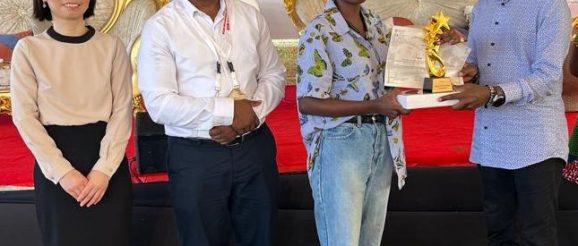Girls dominate ICT innovation challenge with 2m using internet for business

The sustained focus on training girls in ICT is beginning to bear fruit as indicated by the domination by ladies who took the top two slots in the just concluded Digitruck Innovation Challenge in Mombasa.
Out of 1,5000 entrants, Irene Mutinda and Lucy Ochieng’ scooped first and second place respectively for their concepts that outlined how to effect positive social change using digital technology. Ms. Mutinda put forward an idea to create spaces for young people to acquire digital skills and monetize them through setting and running ads, building websites, and developing applications.
On her part, Ms. Ochieng’ centered on matching youth virtually to industry mentors both locally and across the globe due to the growing need for youth to access mentorship programs to accelerate career and personal growth.
Mohamed Suleiman took third place for conceptualizing to help young people acquire cheap smartphones and provide training monetizing social media platforms such as YouTube and Tiktok.
The criteria used by the judging panel to arrive at the winners included their understanding of the problem, the suitability of the proposed solution, their ability to implement the solution, the use of digital skills, and the incorporation of technology in the solution.
Officiating at the ceremony, Joe Mucheru, the Cabinet Secretary for the Ministry of ICT, Innovation and Youth Affairs said that competitive platforms such as Kenya’s Digitruck Innovations Challenge expose brilliant indigenous original ideas.
If these ideas are nurtured well, they have the potential to change lives for the better in local communities. He added that the government had trained more than 60,000 youths under the Ajira program on online enterprise skills.
According to Mucheru, recent data shows that nearly 2 million Kenyans are doing business on the internet. The opportunities though, remain immense and the government is working with private and NGO partners to facilitate better preparation for the youth to immerse themselves competently in the digital sphere.
Echoing his sentiments, Huawei Deputy CEO Ms. Fiona Pan and Swahili Pot Hub Founder Mr. Mahmoud Noor noted that the fourth industrial revolution, driven largely digitally, has the potential to unleash a surge of innovation that could transform industries and improve social well-being.
“The innovative ideas presented in the challenge had a critical role in supporting the attainment of the Sustainable Development Goals. They were about responding to the needs of society”,
said Mahmoud Noor.
The innovation challenge, organized by Huawei in partnership SwahiliPot Hub, Safaricom, and The Ministry of ICT, Innovation and Youth Affairs’ Ajira Digital during Pwani Innovation Week, was designed for the youth to use their digital skills to develop innovative challenge ideas that can be actualized and scaled.
The DigiTruck project was launched in 2019 to promote digital inclusion in remote and rural communities in Kenya. The truck is currently in its 3rd year of training where it has been able to offer training to more than 2,300 youth in 19 different counties across Kenya including Mombasa County.
Each 40-hour course covers basic digital literacy skills, including how to use smartphones, the Internet, email, and office software as well as guiding e-waste management. The training also covers a range of essential soft skills such as drafting business documents, searching for jobs online, and starting an online business. Close The Gap and Computers for Schools Kenya are the local implementing partners for DigiTruck.
